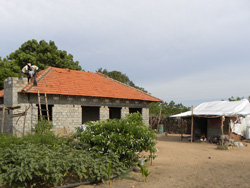UN-Habitat Extends Its Permenant Housing Support Programme in Northern Sri Lanka: 4,400 More Families to be Assited
With European Commission (EC), Australian government (AusAID) and the Swiss government (SDC) funding support, UN-Habitat intends to reach 4,400 new families with permanent housing support in the Northern districts of Sri Lanka in partnership over the next two and a half years. The programme mobilizes USD 23.5 million targeting the districts of Killinochchi, Mullaitivu and Vavuniya, and will help beneficiary families to resume their lives with a sense of normalcy.
 UN-Habitat has been invited by the Sri Lankan Governments’ Presidential Task Force for Resettlement, Development and Security in the Northern Province to assist the permanent shelter and infrastructure recovery in the north.
UN-Habitat has been invited by the Sri Lankan Governments’ Presidential Task Force for Resettlement, Development and Security in the Northern Province to assist the permanent shelter and infrastructure recovery in the north.
Families have now returned to their places of origins following the conclusion of a 3 decade long conflict in May 2009. More than 50 villages will be assisted in this programme for the full reconstruction of 2,200 fully damaged houses, and the major repair of a further 2,200 damaged houses.
Sri Lanka is faced with an opportunity for long term peace and sustainable development, and timely assistance in re-establishing these families in sustainable settlements through permanent reconstruction of their houses will provide them with a sense of safety, security and dignity. This “foundation” will help the process of social integration and to recover from the deep trauma faced during the conflict through physical injury, loss of family members, livelihoods and physical assets.
Through a “Home Owner Driven” approach, this programme seeks to “empower” the beneficiary families to be in charge of their own recovery process. This methodology has proven successful in the post-tsunami recovery programme of UN-Habitat in rebuilding over 10,000 homes, whilst establishing strong communities and community infrastructure.
 Technical assistance and guidance for reconstruction will be provided to all beneficiaries by field based UN-Habitat teams. Vulnerable groups such as women headed households and physically disabled will be given priority assistance in order to ensure their safety and welfare. Due to destruction of documents during the conflict, many families struggle to prove their ownership of land and it is anticipated over 1,000 families will benefit from assistance to establish security of tenure.
Technical assistance and guidance for reconstruction will be provided to all beneficiaries by field based UN-Habitat teams. Vulnerable groups such as women headed households and physically disabled will be given priority assistance in order to ensure their safety and welfare. Due to destruction of documents during the conflict, many families struggle to prove their ownership of land and it is anticipated over 1,000 families will benefit from assistance to establish security of tenure.
More than 600 youths from the beneficiary communities will receive construction skills training through the technical support under an SDC initiative. The families will also contribute their labour to the reconstruction efforts and material will be procured locally, in turn helping the growth of local economies.
This generous financial contribution from the EC, AusAID and SDC comes at a critical moment in the recovery process in the north.
